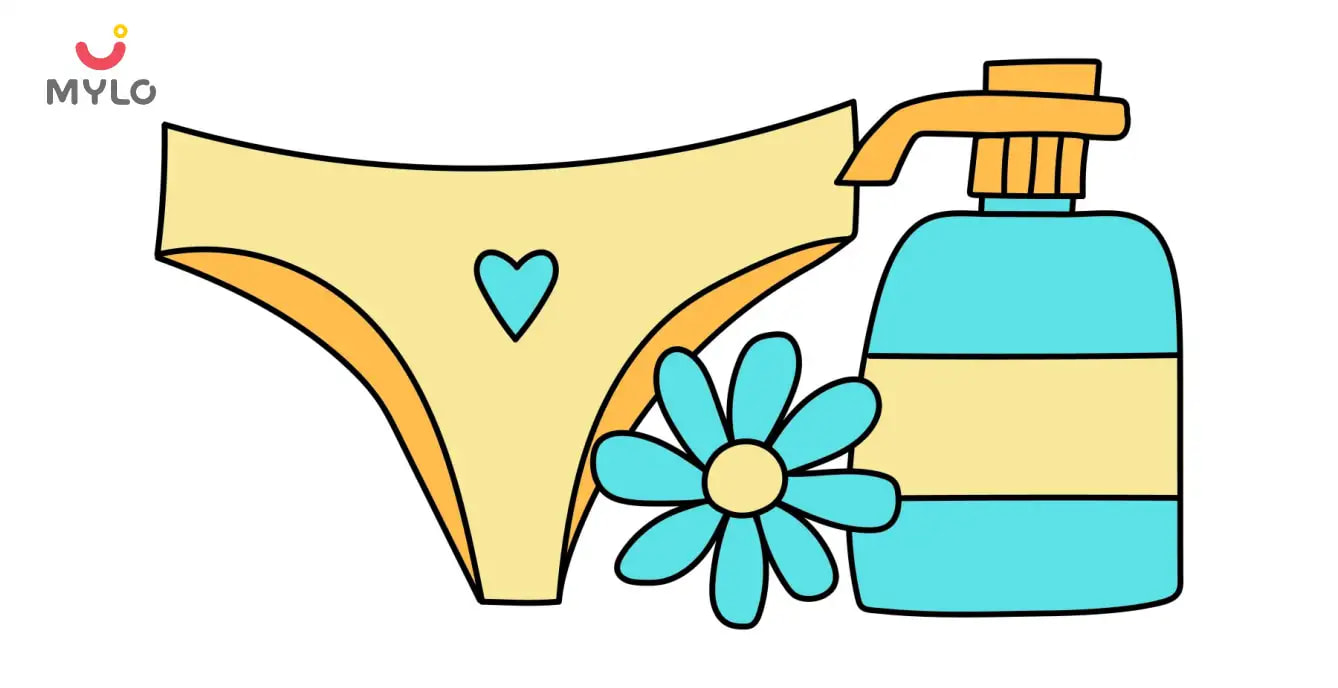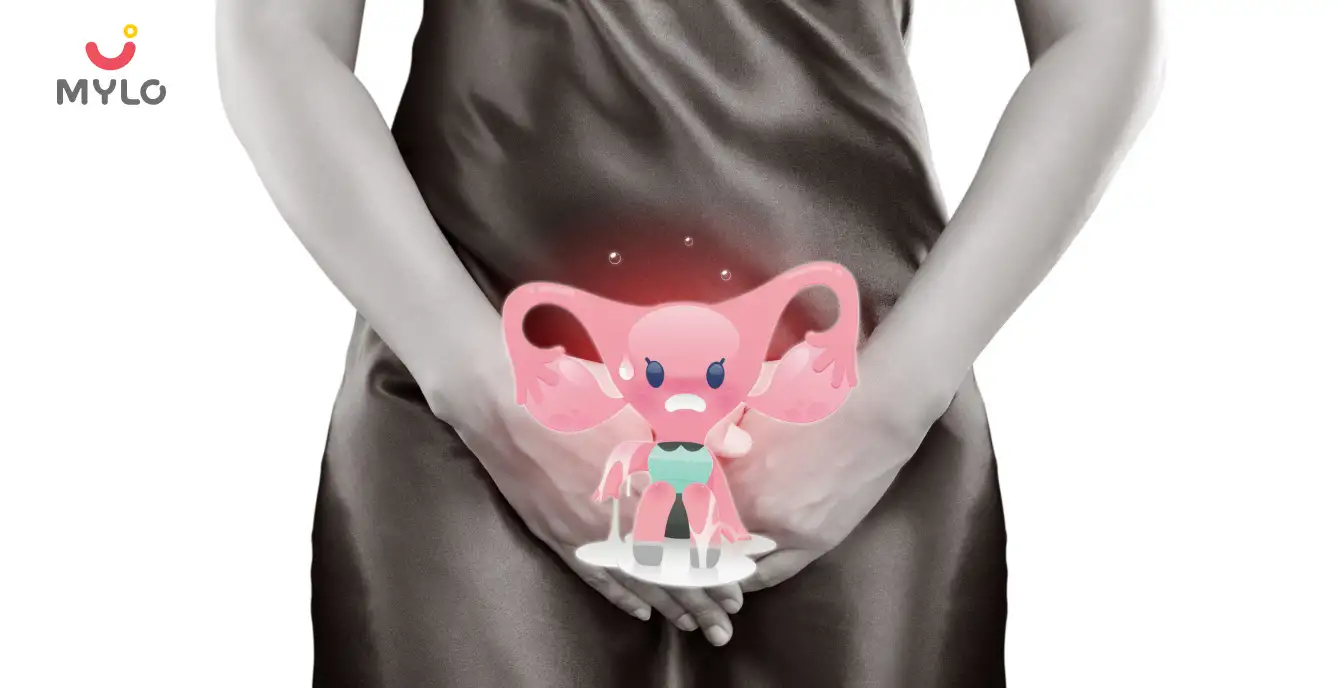- Home

- How to Clean Your Vagina & Vulva Complete Guide
In this Article

Pregnancy
How to Clean Your Vagina & Vulva Complete Guide
Updated on 12 October 2023
Poor vaginal hygiene is one of the leading causes of UTIs, vaginitis, candida, and other infections in the female body. Maintaining good vaginal hygiene is essential for overall health and well-being. Still, knowing precisely how to clean vaginal area without causing irritation or discomfort can be challenging.
In this complete guide, we will cover everything you need to know about how to clean the vagina and vulva, including the importance of cleaning the vagina, the difference between the vagina and vulva, the best practices for washing the vagina, methods to avoid while cleaning vagina and when to visit a doctor.
Is it essential to clean your vagina?
Yes, it is essential to clean your vagina as it helps maintain good hygiene and prevents the buildup of harmful bacteria and odors. The vagina is a self-cleaning organ capable of maintaining its balance of healthy bacteria. Still, proper hygiene practices can help support this natural process and prevent infection and irritation.
However, it is essential to note that over-cleaning or using harsh soaps and other products can disrupt the natural balance of the vagina and lead to irritation or infection. So, it's essential to balance keeping the vagina clean and not over-cleaning or using harsh products that can cause harm.
Difference between the vagina and the vulva
The vagina and vulva are two distinct parts of the female genitalia, with different functions and structures.
The vulva refers to the external genitalia of the female reproductive system, which includes the mons pubis, labia majora, labia minora, clitoris, and vaginal opening. The vulva is part of the female anatomy visible from the outside.
On the other hand, the vagina is an internal canal that connects the cervix (the lower part of the uterus) to the outside of the body. The vagina is where menstrual blood and sexual fluids pass through during
How should I clean my vulva?
To clean your vulva, follow these steps:
1. Use clean, warm water:
Use lukewarm water to clean your vulva. Avoid hot or cold water, as extreme temperatures can cause discomfort or irritation.
2. Use a mild intimate wash:
Use a gentle, fragrance-free intimate wash to clean the vulva area. Avoid using harsh soaps or scented products that can cause irritation or disrupt the natural balance of the vagina.
3. Gently wash the area
Use your fingers or a soft cloth to gently wash the vulva area, including the labia minora and majora, the clitoral hood, and the perineum (the area between the vagina and anus).
4. Wear clean,breathable underwear
Change your underwear regularly and choose breathable fabrics, such as cotton, to help prevent moisture buildup.
Remember, it is vital to maintain good hygiene practices without over-cleaning or using harsh products that can irritate you. Consult your healthcare provider if you experience any discomfort, itching, or abnormal discharge.
You may like: Is It Safe to Use an Intimate Wash to Clean the Vagina During Pregnancy?
Methods you should avoid while cleaning your vagina
It is essential to avoid specific methods while cleaning your vagina to prevent irritation, infection, and other health issues. Here are some methods you should avoid:
1. Douching
Douching involves rinsing the vagina with water or other fluids, such as vinegar or peroxide. However, douching is not recommended as it can disrupt the natural balance of bacteria in the vagina and increase the risk of infection.
2. Using scented products
Avoid using scented soaps, bubble baths, or other products on your vulva or vagina. These products can irritate the area and disrupt the natural balance of bacteria.
3. Using a loofah or scrub brush
Avoid using a loofah, scrub brush, or another abrasive tool to clean your vulva. These can cause irritation and damage to the delicate skin in the area.
4. Wiping back to front
When wiping after using the toilet, wipe from front to back to prevent bacteria from the anus from entering the vagina.
When to visit a doctor
It is essential to visit a doctor if you experience any of the following symptoms:
-
Irregular menstrual bleeding or bleeding between periods
-
Pain or discomfort when urinating
-
Skin changes or growths on or around the vulva or vagina
-
Signs of a sexually transmitted infection (STI), such as sores, blisters, or bumps on or around the genitals, pain or discomfort during sex, or unusual discharge
Closing Thought
Ladies it is essential to maintain good vaginal hygiene and implement the steps discussed on how to clean vaginal area to keep it dry and odorless. You should follow these practices and make them part of your daily routine to avoid frequent vaginal infections.
References
1. Chen Y, Bruning E, Rubino J, Eder SE. (2017). Role of female intimate hygiene in vulvovaginal health: Global hygiene practices and product usage. Womens Health (Lond).
2. Crann SE, Cunningham S, Albert A, Money DM, O'Doherty KC. (2018). Vaginal health and hygiene practices and product use in Canada: a national cross-sectional survey. BMC Womens Health.



Written by
Madhavi Gupta
Dr. Madhavi Gupta is an accomplished Ayurvedic doctor specializing in Medical content writing with an experience of over 10 years.
Read MoreGet baby's diet chart, and growth tips

Related Articles
Related Questions
Hello frnds..still no pain...doctor said head fix nhi hua hai..bt vagina me pain hai aur back pain bhi... anyone having same issues??

Kon kon c chije aisi hai jo pregnancy mei gas acidity jalan karti hain... Koi btayega plz bcz mujhe aksar khane ke baad hi samagh aata hai ki is chij se gas acidity jalan ho gyi hai. Please share your knowledge

I am 13 week pregnancy. Anyone having Storione-xt tablet. It better to have morning or night ???

Hlo to be moms....i hv a query...in my 9.5 wk i feel body joint pain like in ankle, knee, wrist, shoulder, toes....pain intensity is high...i cnt sleep....what should i do pls help....cn i cosult my doc.

Influenza and boostrix injection kisiko laga hai kya 8 month pregnancy me and q lagta hai ye plz reply me

Related Topics
RECENTLY PUBLISHED ARTICLES
our most recent articles

Miscarriage
Blighted Ovum: Causes, Symptoms & Treatment

Folic Acid
The Ultimate Guide to Consuming Iron and Folic Acid Tablets

Vaginal Discharge
White Creamy Discharge: Is It Normal or a Cause for Concern?

Conception
First-Time Sex & Pregnancy Chances: What You Need to Know

Twins & Triplets
The Ultimate Guide to Twin Pregnancy Symptoms at 4 Weeks

Sex Life
A Comprehensive Guide to Understanding the Effects of Masturbation
- Placenta Position: How It Affects Your Pregnancy and Delivery
- Clitoral Hood: Benefits, Risks & More
- Pelvic Exam: Details, Outcomes & Dos & Don'ts
- My life mantar is - HARE KRISHNA HARE KRISHNA KRISHNA KRISHNA HARE HARE HARE RANA HARE RAMA RAMA RAMA HARE HARE which means no matter what is going in your lifejust keep this mwntra in your mind every minute every sec everything will be good automatically. U will not need any other mantra
- Early Pregnancy & Egg White Discharge: What You Need to Know
- Dilation and Curettage (D&C): Procedure, Risks & Benefits
- Alivher Tablet Uses: How to Maximize the Benefits for Your Reproductive Health
- Incompetent cervix: Causes, Symptoms, & Treatment
- Soda During Pregnancy: Is It Safe or Should You Avoid It?
- Watery Discharge Before Period: Is It Normal or a Cause for Concern
- Sperm Cramps: Debunking Myths and Shedding Light on the Facts
- Bitter Gourd During Pregnancy: Benefits and Precautions You Should Know
- First Period After Failed IVF Cycle: What to Expect and How to Cope
- Freezing Eggs: The Pros and Cons of Preserving Your Fertility


AWARDS AND RECOGNITION

Mylo wins Forbes D2C Disruptor award

Mylo wins The Economic Times Promising Brands 2022
AS SEEN IN
















- Mylo Care: Effective and science-backed personal care and wellness solutions for a joyful you.
- Mylo Baby: Science-backed, gentle and effective personal care & hygiene range for your little one.
- Mylo Community: Trusted and empathetic community of 10mn+ parents and experts.
Product Categories
baby carrier | baby soap | baby wipes | stretch marks cream | baby cream | baby shampoo | baby massage oil | baby hair oil | stretch marks oil | baby body wash | baby powder | baby lotion | diaper rash cream | newborn diapers | teether | baby kajal | baby diapers | cloth diapers |





